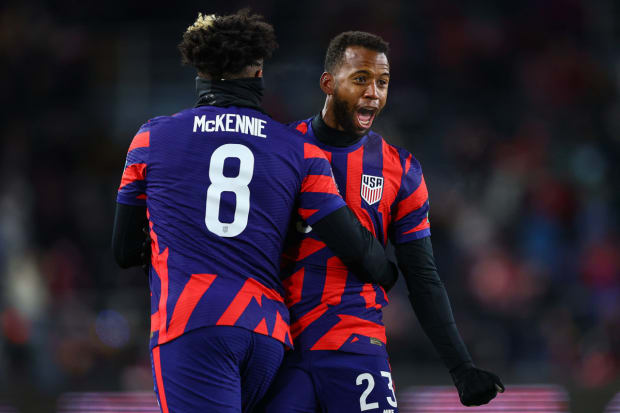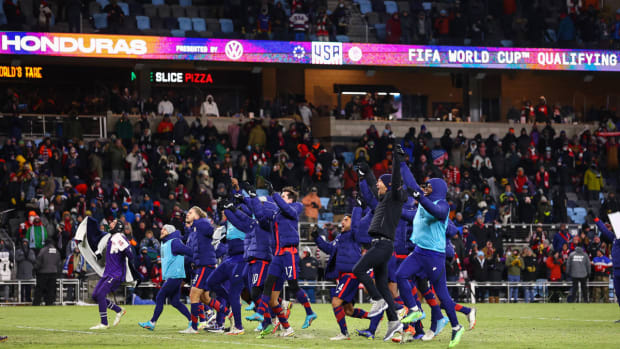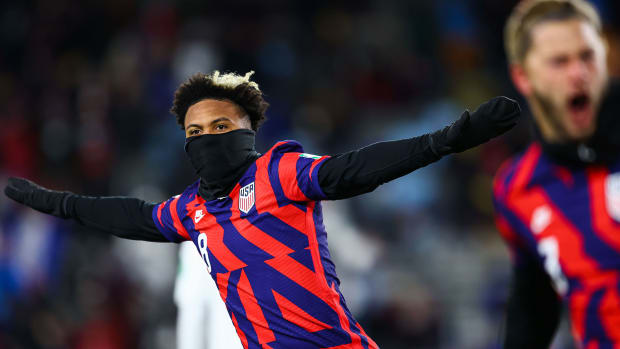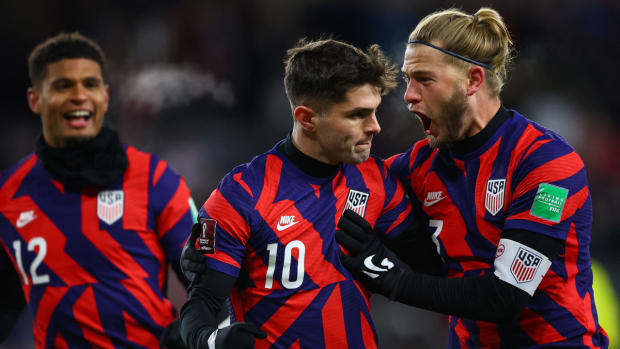ST. PAUL, Minn.— Enveloped by absurd, historically low temperatures that left many questioning the sanity of simply playing the game, the U.S. men’s national team enjoyed a timely thaw in a long-dormant component of its attack on Wednesday night in the Twin Cities. And with it, came a warming of its World Cup prospects.
Qualifying difficulties always seem to come as a surprise, even though you could set your quadrennial calendar to them. Negotiating the Concacaf gauntlet is never as easy as pedigree and predictions suggest it should be, and adversity is inevitable. A lot of the recent consternation surrounding the U.S. has been focused on its floundering offense. It hasn’t produced the fireworks many expected from a team of skillful and exuberant players who have made their way to some of the sport’s biggest clubs, and a coach who has preached proactive soccer.
The Americans had managed just 13 goals through their first 10 games of Concacaf’s Octagonal, which will send the top three finishers directly to Qatar's 2022 World Cup. And with just one goal across the first two matches of this penultimate window, the U.S. was in danger of slipping toward fourth.
It was 3 degrees when the U.S. and Honduras kicked off Wednesday at Allianz Field, and the wind chill was a painful -13. Nothing flows in those conditions. The effective attacking play the hosts and their fans have been searching for was going to be tough to muster. So enter Kellyn Acosta—who started because of a hamstring injury suffered by midfield anchor Tyler Adams—and welcome back to the U.S. set piece.

Harrison Barden/USA TODAY Sports
Although set pieces traditionally have been a strength, the Americans had somehow failed to convert a single free kick or corner kick in qualifying. Then when they had to win, and despite the cold, they scored off three, each delivered with pinpoint precision by Acosta. The resulting 3-0 triumph, which was never in doubt after Acosta and Weston McKennie combined to lift the hosts to an 8th-minute lead, allows the U.S. (6-2-3) to breathe slightly easier and stay in second place ahead of the climactic March window.
“It always frustrates me when we don't score off set pieces because … we have a lot of threats, a lot of aerial threats who are very good off set pieces in the air,” said U.S. center back and captain Walker Zimmerman, who tallied the game’s second goal following an Acosta free kick in the 37th minute. “It's a pretty wild stat that we hadn't gotten any into the back of the net [in qualifying]. And so for us to deliver tonight came at a really good time.”
Breathing, sighs of relief, running, basic motor functions—all of it was going to be a challenge in Minnesota. The coldest event in U.S. Soccer history, and one of the coldest pro sporting events ever staged in North America, Wednesday’s qualifier was a test of wills as much as a test of tactics and technique. The Federation, with support and significant input from Berhalter and his medical staff, chose St. Paul in order to reduce the travel time following Sunday’s loss in Ontario, maintain a consistent climate through a window that started in Columbus, undermine a winless Honduran side traveling from the relative warmth of Central America and lastly, increase the likelihood of a pro-U.S. crowd.

Harrison Barden/USA TODAY Sports
During the buildup to Wednesday’s game and again after it concluded, Berhalter offered nothing but defiant support for the decision. Two Honduran players exited at halftime with reported symptoms of hypothermia, including goalkeeper Luis López. But the American manager said there were mitigation strategies in effect for both teams, including thermal gear, supplies and heaters at the benches (the referee forced U.S. goalie Matt Turner to discard his quarterback’s hand warming pouch, which came courtesy of the Minnesota Vikings). In addition, Berhalter reminded everyone that there was rarely any sympathy for the U.S. when it suffered on trips to Latin America.
“When we go down to those countries and it's 90 degrees and 90% dew point and it's unbearable humidity and guys are getting dehydrated and cramping up and getting heat exhaustion, you know that's that's the nature of our competition,” Berhalter explained.
“We wanted to minimize travel. We knew we were going to be playing in cold weather in two of the games, and we figured to do it in the third game as well instead of switching climates,” he added. “A cold spell came through and it's something we can't control. All we can do once that happens is try to mitigate the risk by having warm-weather gear and going out there and competing, and we did that.”
Indeed they did. First halves haven’t been kind to the U.S., which had netted only twice before intermission in the Octagonal. But the Americans were on the front foot from the opening whistle on Wednesday. McKennie, Acosta and Luca de la Torre, the 23-year-old Californian who’s been in good form at Dutch club Heracles, established almost immediate command. Meanwhile, wingers Tim Weah and Jordan Morris, who was starting in place of Christian Pulisic, were active and frequently able to stretch the Honduran defense.
“To be honest, I don't think [Honduras] wanted any part of that tonight,” Zimmerman said of the cold’s early impact.
McKennie, who saw a goal-bound header saved spectacularly by Canada’s Milan Borjan on Sunday, gave López no chance with his 8th-minute nod. Acosta’s delivery from the right flank was sublime. It broke the Americans’ set-piece hex and demoralized Los Catrachos (0-8-3).
“It was huge getting the first goal. It's something that we haven't been able to do early on in games enough, and you can just tell that it provided a big boost for us and it really hurt Honduras,” Zimmerman said. “You know they they pretty much shut down after we got that goal, and we grew in confidence. We grew into the game.”

Harrison Barden/USA TODAY Sports
Berhalter had said that confronting cold was a mindset. His team seemed to agree. Only a couple players wore leggings, and just Turner covered his head during the first half (a couple more Americans added balaclavas to their ensemble later on.) McKennie occasionally pulled a neck gaiter over his face. The pace of play was good, and the U.S. didn’t try to reduce its game to the bare bones. It passed and moved. The midfield trio pulled the strings, and so the U.S. managed 16 shots, eight corners and a pass completion percentage of 86.5%. It was among its best performances of the Octagonal.
“I think if you focus too much on the weather, then it can really kill you,” De la Torre said. “If you're worried about how your body reacts or all the negative things that can happen, then you can have problems.”
The temperature continued to drop, eventually winding up at 0 degrees with a wind chill of -17 as the game concluded. But the U.S. was buoyant. The vital three points were sealed with an emotional third goal. Pulisic replaced Morris in the 64th minute and shortly after being greeted with a hard foul in the Honduran half, he broke through with a strike that surely will do wonders for his confidence. Facing some uncertainty at Chelsea and ineffective for the U.S. as a starter against El Salvador and Canada, Pulisic needed a bit of warmth. And when Acosta’s corner kick was flicked on by Ricardo Pepi and then touched by Zimmerman into Pulisic’s path, he made no mistake.
“I think the hardest thing to do as a coach is to talk to a player and tell them that you support him and you're behind him 100%, and then you don't start them, because the player feels somehow that you're not supporting him. And for Christian, it was a very difficult decision. But I felt it was a decision that was made to put him in the best possible position to make the impact that we know he can make,” Berhalter said. “And that's why when he's in those positions on the field, he has the quality to make finishes like that and to score goals like that. And that's the impact that he made for the group, and really it helped seal the victory for the team."

Harrison Barden/USA TODAY Sports
Helping Pulisic find his form, or at least to start rebuilding his confidence and rhythm before March, is vital. That goal was a good start (he had a potential second called back for offside in the closing minutes). The U.S. will have everything to play for in March—trips to Mexico City and Costa Rica, where it’s never won a qualifier, sandwiched around a home date against fourth-place Panama in Orlando. The top spot in the Octagonal is almost certainly out of reach following Canada’s win on Wednesday in San Salvador. The gap is now four points.
But there’s no title at stake and no trophy on the line. All that matters is finishing at least third and booking passage to the World Cup. And so winning in St. Paul was vital, and the U.S. escaped into the warmth of its locker room feeling good about what it overcame, how it responded to Sunday’s setback and where it’s headed. Berhalter quickly posed for a photo with nearby fans during a stoppage in the dying minutes. The stadium was sold out and his players had endured. And while the U.S. broke some bad habits on Wednesday, it maintained its record of exiting Octagonal windows on a high. It's 3-0-0 when playing its third qualifier in seven days.
"I think the hope is that it gives us a lot of momentum, not because we got three points but the way that we got three points,” Zimmerman said. “I thought it was a statement in the way that we competed, the way that we went about the game, went about our business and it definitely looked like the most dynamic performance that we've had—especially this window. So hopefully we can take a lot of positives from this game, keep up the things that we did well and carry that into the next window and be ready to go in Azteca.”







